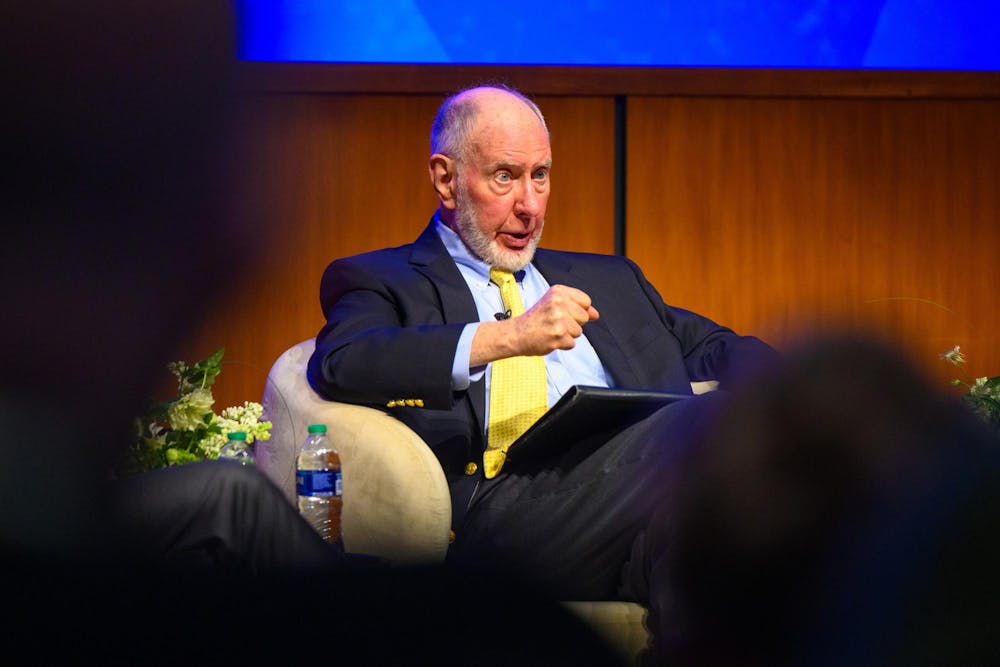“Things are not determined by history,” renowned social scientist and Harvard University professor emeritus Robert Putnam said. “We have agency. The future is up to you.”
Wednesday evening, the Jordan Auditorium in the Mendoza College of Business building was packed. Every seat was filled, with the crowd overflowing into the aisles. The audience was gathered here to celebrate democracy — or rather, consider the factors of its demise.
The 2023-2024 Notre Dame Forum on “The Future of Democracy” is intended to create campus-wide conversations about threats to global democracy and how they can be combated. This was the keynote event. Putnam screened his documentary film “Join or Die” and engaged Notre Dame professors David Campbell and Jaimie Bleck in conversation.

Photo by Matt Cashore/University of Notre Dame
“At a time when many scholars focus on their questions, professor Putnam has made a career of tackling big issues,” University president-elect Fr. Robert Dowd said. “His research on the importance of engagement, social connections and strong communities for the survival of democracy has been influential around the world.”
“We are especially pleased professor Putnam has had a long friendship with so many here at Notre Dame,” he continued. “Even though he started his career at the University of Michigan.”
After graduating from Harvard, Putnam originally studied how club membership fosters democracy in disparate Italian communities. After finishing his project and returning to America, he was shocked by the decline in public trust in the government — and thought he would apply what he’d been studying to American communities.
He found club memberships help generate trust among citizens and consequently increase social productivity. But membership in every type of American associational club he studied was in decline. The social fabric — the fabric that upholds democracy — was dissolving. After five years of research, Putnam had enough evidence for a book.
In 2000, Putnam published “Bowling Alone: The Collapse and Revival of American Community,” a groundbreaking exploration about how joining clubs fosters American democracy. The book reinvigorated academic interest in social capital — a belief that, as Putnam says, social networks have value.
“Join or Die” documents Putam’s social capital research and its potential for fostering democracy. In particular, it was concerned with how to build connection in a post-pandemic America.
The discussion after the film was moderated by political science professor Jaimie Bleck, who specializes in African politics. She is currently writing a book on informal tea-drinking clubs in Mali and how they generate social capital and democratic citizenship. This semester, she is also teaching a political science class about social capital called “Social Capital 101: How to Build a Block Party.”
Putnam was in conversation with his former student David Campbell — the another political science professor and the director of the Notre Dame Democracy Initiative. Campbell contributed to Putnam’s research on “Bowling Alone” as an student at Harvard University. Putnam and Campbell have since collaborated on “American Grace: How Religion Divides and Unites Us,” a book that focuses on how interfaith social ties create religious tolerance. Now, Campbell’s research focuses on civic and political engagement, with particular attention on religion and young people. He is teaching about social capital in his Religion and American Politics class currently.
During the discussion, Putnam argued social capital is more important than ever.
“This year is a big deal,” Putnam said in reference to the upcoming presidential election. “This country needs a moral reawakening. We owe it to each other.”

President-elect Fr. Robert Dowd and a student discuss social capital after the event.
In “Join or Die,” Putnam is moved to tears thinking about the entreaty of President John F. Kennedy’s inaugural address: “Ask not what your country can do for you. Ask what you can do for your country.”
“My life has been about answering that call to action,” Putnam said. He hopes others will do the same.










